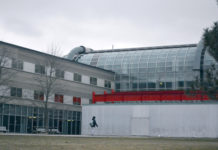C<em>ounter Strike</em> is an online first person shooter that was first released in 2000 by Valve. Since then, the game has gone through multiple iterations; with the most current being <em>Counter Strike: Global Offensive (CS:GO) </em>which was released in 2012. The game has a massive user base as 10.4 million unique players logged in during February 2016.</p>
With e-sports as a whole on the rise, more and more organized competitive leagues are popping up, giving not only professional players a platform to compete, but also university students. Professional players will typically play in larger, international leagues like Major League Gaming or Electronic Sports League that have massive prize pools. There are leagues devoted to solely college and university students such as the Collegiate Star League (CSL).
There are 79 schools in the CSL from North America and Europe competing in the 2015-2016 CS:GO season, with Waterloo being one of them.
A few other participating Canadian schools include the University of New Brunswick, Ryerson University, the University of British Columbia, and the University of Toronto.
The Waterloo team, simply titled “The Waterwoo Warriors” is comprised of six players: team captain and coordinator Derek “HentaiHero” Jedral, Kien “csr” Dang, Nathan “acroniks” Choi, Shameel “Meeoh” Abdullah, Michael “Hyunbin” Kim, and Tony “FuzzySeal” Bao.
Unlike traditional sports leagues like the OUA and CIS, the CSL does not have any direct affiliation or communication with the competing schools. Teams are self-organized and independently responsible for signing up.
Despite being self-regulated, the CSL still has many rules that competing teams must abide by in order to enter. Teams must be comprised of players from the same school and must have a valid university email address. Each player must be enrolled as a full-time student and they cannot play while on academic probation.
“They check your transcript and verify that you’re in school with good academic standing,” Choi said.
The initial construction of Waterloo’s team occurred very organically. Most of the CS:GO community on campus communicates via a Facebook group. A few members gauged interest in making a competitive team, which eventually formed into the team now.
“We all started off as random university students. We all played CS:GO and we started playing more together and ever since then we just played as a team,” Dang said.
Each school is only allowed to enter one team so roster spots are limited as a CS:GO match is five-on-five and teams will have a few substitutions. Those who want to enter the team will have to showcase their skill in a tryout as well as commit to a season-long affair.
The CSL season spans the fall and winter school terms. Teams will play once a week, typically on Sundays. There will be seven games during the fall term, then a break for exams, then seven more games and playoffs in the winter term. The winning team will go home with $5,000 but the competition is what drives the team to play.
“Playing anything competitively is more fun. It’s a different experience than just public play,” Abdullah said. “You get to meet new people; I met these guys,” Choi added.
Just like any other competitive team, a lot of time is put into practice and strategy planning. The team would schedule practice three times a week and before games Jedral would scout their opponents by “[finding] replays of games and [finding] out how they played. [Also] learning their bad habits and how to take advantage of it,” Abdullah said.
The team was successful during the regular season as they finished with a 13-1 record. Unfortunately, they lost to the University of Arizona Wildcats in the first round of the playoffs.
The team is currently in their offseason. Once done exams they will join a more casual, open-rec style league to help prepare them for next season. They are also trying to build the CS:GO culture on campus by starting an official club but ran into some communication problems with Feds.
“I also tried applying to make a CS:GO club. It was so weird, I applied and [Feds] emailed me back. They’re like ‘your application is not in good format. Reformat and send it again.’ So I sent it again and they just never got back to me. I emailed again asking if it was good now and they never responded,” Abdullah said.
As for making a career out of CS:GO, “not a chance, it’s not gonna happen. I feel like any of us could but the amount of time you have to put in … It’s like a full time job, 40 hours a week. I would get mad,” said Choi and Abdullah.






























